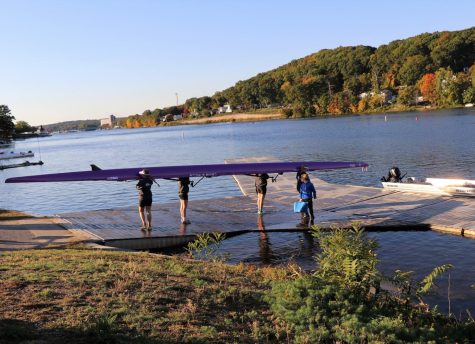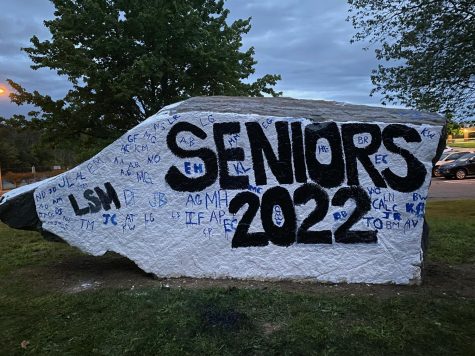Climate change proves a factor in voting to varying degrees
Snow collects in Sessions Woods, Burlington in late-October, a rare-sight so early in the year.
November 17, 2020
According to NASA, Carbon dioxide levels in our atmosphere are the highest scientists have seen in 650,000 years. With increasing levels of CO2 and rising concern among environmentalists, climate scientists believe a plan for the future of our planet is crucial. Which raises the question: was climate change a large concern for Connecticut voters in the recent election?
When asked if “going green” and leading more environmentally friendly lifestyles was important, several Lewis Mills alumni and current students, who planned to vote for the first time, unanimously answered “yes.”
After filling out a survey on climate change and the election, Hunter Cowger, a 2018 Lewis Mills graduate said, “[I am] happy to fill out anything that raises awareness for climate change.” But for him, compared to other issues, climate change is a secondary priority when deciding who to vote for.
His concern about climate change centers on its ramifications: “Many coastal cities will be flooded, due to the increase in ocean levels. It will be devastating to future generations.”
Senior at Lyme-Old Lyme High School and former Lewis Mills student Avery Lacourciere planned to cast her vote this fall and listed the issues of coronavirus, abortion, economy, health care, gun policy and racial and ethnic equality as high on her list of priorities.
Similar to Cowger, she said: “I think that it’s very important that we are aware of the damage we are causing to the environment.”
Lacourciere believes that although the candidates’ perspectives on climate change is not a deciding factor in her vote, it does play a role in her decision.
“I think it definitely has an impact on the overall image of each of the candidates. I think that ignorance towards the issue from a certain candidate definitely helps to sway my vote away from that candidate,” she said.
Paul Rochford, president of the Burlington Land Trust takes a similar view as Lacourciere, noting that “it is irresponsible for leaders to dismiss climate change as some kind of hoax.”
Rochford includes his disappointment in seeing climate change progress throughout his lifetime, and when asked about a plan of action he responds, “One election will not fix things so I would prefer to see a bipartisan approach for a long term solution.”
When asked about how climate change has impacted Connecticut, Rochford replied that he did not have the expertise to speak on the subject, but Eco-Action Club advisor and Lewis Mills science teacher Alan Hanks responded in depth, stating, “Here in CT we are experiencing more extremes in weather conditions. This is seen by: this summer’s heat wave with 20 days reaching over 90 degrees, increase of average annual temperature, extended periods of drought, and extreme weather events that drench us with large amounts of precipitation all at once. It is hard for scientists to pinpoint if a particular storm event is caused by climate change, but the overall trend of more intense storms is one of the indicators of climate change.”
A recent study by University of Massachusetts Amherst found that local temperatures in Connecticut “increased by about 3°F (1.7°C) since 1895 – faster than the rise in global mean temperature. The annual mean temperature in CT has exceeded the 20th-century average every year since 1993 (the last 22 years). Temperatures are projected to increase by over 5°F (2.8°C) relative to pre-industrial levels.”
Keeping these observations in mind, Hanks believes that the outcome of the election could make a difference in the progression, or lack of progression, in climate change. President-elect Joe Biden has indicated plans to re-join the 2015 Paris climate accord, an international cooperative initiative to curb climate change.
“Scientists are currently worried about being at the tipping point of CO2 levels in our atmosphere. A tipping point is where a feedback loop is created. An example of this is where the increased CO2 in our atmosphere will trap heat, increasing the global temperatures causing the artic tundra to thaw and decompose, releasing more CO2 and CH4 into the atmosphere, trapping more heat,” said Hanks. “If we have another administration that does not act to reduce CO2 emissions, we may reach that tipping point where we can’t reverse or even slow the process of climate change.”
Brendan Tewksbury, a teacher of civics and American government at Mills, said of the candidates’ views on climate change: “It probably ought to be more of a big deal for me, but I can tell you that has not been an active concern [for me] in this particular election.”
Despite the issue’s lack of relevance in his decision in the 2020 election, Tewksbury acknowledged its importance, “Although, if I had to pick an issue that was going to affect me and my eventual children and the future, that should probably take precedence over most other things.”
According to the Pew Research Center, “The economy is consistently a top voting issue,” with only 42 percent of surveyed voters across the country claiming that climate change is very important in this election. It fell as the second lowest of twelve issues surveyed on, just above abortion by 2 percent.
Many voters seemed to be aware of climate change and its effects on our planet, but amid other issues, climate change was not being considered a deciding factor when casting their ballots on Nov. 3.
Lewis Mills graduate and current Providence College student Sam Buchanan commented that, “It’s an issue that gets worse the longer we ignore it.”
Will the 2020 election set us on a more aggressive path to combatting climate change? Will our deliberate actions – or inaction – dictate the future of life on Earth? Only time will tell.









